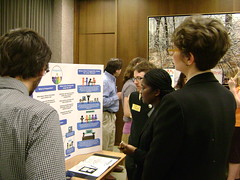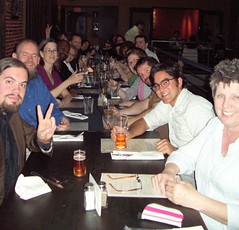Tuesday, May 22, 2012
 New librarians are entering the job market fresh from receiving
their master's degree (MLIS). The months and years spent in the classroom are
behind them and they are anxious for the next chapter of their lives to begin.
Some have already found job opportunities. Others are still in the job hunt and
wondering when a job offer will appear. For them, this is a time of doubt. Was
getting an MLIS the right thing to do? Weren't a ton of librarians suppose to
be retiring? Is this the right time to be a librarian?
New librarians are entering the job market fresh from receiving
their master's degree (MLIS). The months and years spent in the classroom are
behind them and they are anxious for the next chapter of their lives to begin.
Some have already found job opportunities. Others are still in the job hunt and
wondering when a job offer will appear. For them, this is a time of doubt. Was
getting an MLIS the right thing to do? Weren't a ton of librarians suppose to
be retiring? Is this the right time to be a librarian?
Because of the committees that I serve on, the people I meet with, and the consulting work that I do, I see the profession from a different point of view than most. With those points of view in mind, let me tell you why this is the time for librarians.
The Graying of the Profession - We have been talking for years about the number of librarians that would be retiring. However, the economic downturn that begin in 2008 delayed retirements. Those librarians who have stayed - instead of retiring - will retire. Some might even work in organizations that have a mandatory retirement date. All of those retiring librarians will need to be replaced. Will they be replaced with a new graduate? In some cases, yes. In many cases, they will be replaced with someone else, who will then could be replaced with a new graduate.
In addition, when people did retire, they were often not replaced. The need for them didn't go away because their work didn't go away. As our economy improves, those vacancies will be filled.
 Need for New Ideas - Every information
organization (and not just libraries) need new ideas to move them forward.
Graduates enter the workforce fresh with new ideas and a willingness to put
those ideas into motion. I have seen graduates hired because they are willing
to demonstrate a desire to make a difference and to help an organization dream
big.
Need for New Ideas - Every information
organization (and not just libraries) need new ideas to move them forward.
Graduates enter the workforce fresh with new ideas and a willingness to put
those ideas into motion. I have seen graduates hired because they are willing
to demonstrate a desire to make a difference and to help an organization dream
big.
Librarians Inside and Outside of Libraries - Just last night, I spoke with someone who noted that library and information science graduates are a desirable group because of their ability to gather information and do analysis. Working in non-traditional settings is an area that graduates need to tap into because it is a growth area. This means looking at business job ads for those that require information gathering, organization and analysis skills. This also means promoting, both through your resume and cover letter, what you are capable of doing for them. That may mean describing your library skills in non-library terms.
Among the businesses/industries/areas - including some that are library related - that I think graduates should look at are:
 What about traditional jobs? Yes, they are out there,
although some have morphed due to changing needs. While there are still
cataloguers, there are also people creating metadata and doing text encoding.
While there are still librarians working in traditional collection development,
there are also people helping to acquire, organize and preserve digital
content. While there are librarians staffing in-library services, there are
others who are working out in their respective communities and moving library
services outside of the building. If you are looking for a traditional job,
recognize that they may not be what you think.
What about traditional jobs? Yes, they are out there,
although some have morphed due to changing needs. While there are still
cataloguers, there are also people creating metadata and doing text encoding.
While there are still librarians working in traditional collection development,
there are also people helping to acquire, organize and preserve digital
content. While there are librarians staffing in-library services, there are
others who are working out in their respective communities and moving library
services outside of the building. If you are looking for a traditional job,
recognize that they may not be what you think.
What about the competition? Yes, you have competition and some of them are people you just went to school with. Many employers actually like to have a deep pool of candidates. Some will even keep a search open until they feel that they have received enough job applications, meaning that they aren't going to make a hiring decision based on a small pool of candidates. So, yes, you have competition. While it sounds flippant, the only thing you can do is be consider about yourself. Present yourself, your skills and capabilities in the best possible light and let the competition worry about itself.
How many job applications do you need to do? In Advice for The New Archivist, the author recounts information he has received from others. As I read through the advice, I sense frustration, but also hear people saying to keep applying for positions. In their advice, people talk about sending out dozens of job applications. We often think that we should be hired after sending out a few job applications. If that happens, be thankful. Most people find that they need to apply for multiple jobs and often in a variety of geographic regions.
One of the benefits of sending out dozens of job applications, that is not mentioned, is that the applicant will refine his/her resume and cover letter during that process. In other words, how you present yourself in application #30 should be better worded and focused that in application #1. (Remember that your resume is always a work in progress. It is never "done.") In addition, you should have a better idea of what you are really looking for, what you will accept, etc.
Unless you have done multiple mock job interviews, your first telephone and in-person interviews will be learning experiences. Again, you will get better with practice, no matter if that practice occurs in practice sessions or during real interviews.
What can you do to help land a job? You already know these tips, but I'll repeat them.
Is now the time for librarians?
 New librarians are entering the job market fresh from receiving
their master's degree (MLIS). The months and years spent in the classroom are
behind them and they are anxious for the next chapter of their lives to begin.
Some have already found job opportunities. Others are still in the job hunt and
wondering when a job offer will appear. For them, this is a time of doubt. Was
getting an MLIS the right thing to do? Weren't a ton of librarians suppose to
be retiring? Is this the right time to be a librarian?
New librarians are entering the job market fresh from receiving
their master's degree (MLIS). The months and years spent in the classroom are
behind them and they are anxious for the next chapter of their lives to begin.
Some have already found job opportunities. Others are still in the job hunt and
wondering when a job offer will appear. For them, this is a time of doubt. Was
getting an MLIS the right thing to do? Weren't a ton of librarians suppose to
be retiring? Is this the right time to be a librarian?Because of the committees that I serve on, the people I meet with, and the consulting work that I do, I see the profession from a different point of view than most. With those points of view in mind, let me tell you why this is the time for librarians.
The Graying of the Profession - We have been talking for years about the number of librarians that would be retiring. However, the economic downturn that begin in 2008 delayed retirements. Those librarians who have stayed - instead of retiring - will retire. Some might even work in organizations that have a mandatory retirement date. All of those retiring librarians will need to be replaced. Will they be replaced with a new graduate? In some cases, yes. In many cases, they will be replaced with someone else, who will then could be replaced with a new graduate.
In addition, when people did retire, they were often not replaced. The need for them didn't go away because their work didn't go away. As our economy improves, those vacancies will be filled.
 Need for New Ideas - Every information
organization (and not just libraries) need new ideas to move them forward.
Graduates enter the workforce fresh with new ideas and a willingness to put
those ideas into motion. I have seen graduates hired because they are willing
to demonstrate a desire to make a difference and to help an organization dream
big.
Need for New Ideas - Every information
organization (and not just libraries) need new ideas to move them forward.
Graduates enter the workforce fresh with new ideas and a willingness to put
those ideas into motion. I have seen graduates hired because they are willing
to demonstrate a desire to make a difference and to help an organization dream
big. Librarians Inside and Outside of Libraries - Just last night, I spoke with someone who noted that library and information science graduates are a desirable group because of their ability to gather information and do analysis. Working in non-traditional settings is an area that graduates need to tap into because it is a growth area. This means looking at business job ads for those that require information gathering, organization and analysis skills. This also means promoting, both through your resume and cover letter, what you are capable of doing for them. That may mean describing your library skills in non-library terms.
Among the businesses/industries/areas - including some that are library related - that I think graduates should look at are:
- Publishing industry - This is an industry that is going through massive changes. It needs help in understand how people want to access information as well as how to market its works to new and existing channels (including libraries).
- Pharmaceutical industry - This industry has a continuous need for information gathering and analysis, including working with big data. (There are many other industries that need LIS skills, so this is really just one example.)
- Government agencies - They - national, state and local - are awash in information and need help. Among the help that they need is assistance in capturing/preserving information that is being acquired and created.
- National security - Any organization that is involved in national security needs people to organize and analyze data. They may not be actively recruiting, but that doesn't mean that they aren't hiring. These organizations often take months (yes, even close to a year) to work through the interview/hiring process, so applicants need to be patient.
- Non-governmental organizations - Whether in the U.S. or overseas, these organizations have the same information needs as other businesses or agencies. For those interested in traveling the world, an NGO - or a State Department or Military library - can give you that opportunity.
- K-12 schools - Reportedly, some school districts do not have as many teacher librarians (also called school media specialists or school librarians) as they are mandated to have. While school districts are worried about their funding, they are also worried about meeting the federal requirements and improving student education. Teacher librarians are an important component and there will be openings.
- Library trainers - Information and digital literacy are areas that are growing in importance. Many public and academic libraries are focusing resources (and people) on these. While a new graduate may not feel as if he has ability to walk right into a training position, I encourage graduates to talk about those activities and assignments where you have used skills similar to those used by a trainer. (This could be an area where a YouTube video of you giving a 5 minute training session could be helpful or even the inclusion of lesson plans in your portfolio.)
- Institutional repositories - I spoke with someone recently about the needs of for-profit organizations and government agencies in terms of help with digital data/information. It occurred to me that students who have worked in or studied institutional repositories likely have skills that other organizations want, but that how each talks about the "job" is quite different. If you have institutional repository experience, are you willing to look for a position outside of academia that uses those same skills?
- Search engine development - Companies in this area need help with information retrieval and information organization. They need people that are willing to work with programmers and development staff to create Google's successor or better search on mobile devices or....
- Software development - Librarians understand users and software developers need to understand users (but often don't). LIS graduates can act as a bridge between the two.
- Independent information professionals - In other professions (e.g., medical and legal) graduates often see building their own business as what they want to do. Among LIS graduates, this isn't on everyone's lips, yet it is a viable career choice. There are a growing number of librarians who create their own businesses. Some do it to carry them over between employment opportunities, while others see it as their career choice for them. Likely among the librarians that you admire are people who make a living as consultants. These people work on wide variety of different projects for every type of organization imaginable. Yes, people are starting their own consulting practices right out of grad school.
 What about traditional jobs? Yes, they are out there,
although some have morphed due to changing needs. While there are still
cataloguers, there are also people creating metadata and doing text encoding.
While there are still librarians working in traditional collection development,
there are also people helping to acquire, organize and preserve digital
content. While there are librarians staffing in-library services, there are
others who are working out in their respective communities and moving library
services outside of the building. If you are looking for a traditional job,
recognize that they may not be what you think.
What about traditional jobs? Yes, they are out there,
although some have morphed due to changing needs. While there are still
cataloguers, there are also people creating metadata and doing text encoding.
While there are still librarians working in traditional collection development,
there are also people helping to acquire, organize and preserve digital
content. While there are librarians staffing in-library services, there are
others who are working out in their respective communities and moving library
services outside of the building. If you are looking for a traditional job,
recognize that they may not be what you think.What about the competition? Yes, you have competition and some of them are people you just went to school with. Many employers actually like to have a deep pool of candidates. Some will even keep a search open until they feel that they have received enough job applications, meaning that they aren't going to make a hiring decision based on a small pool of candidates. So, yes, you have competition. While it sounds flippant, the only thing you can do is be consider about yourself. Present yourself, your skills and capabilities in the best possible light and let the competition worry about itself.
How many job applications do you need to do? In Advice for The New Archivist, the author recounts information he has received from others. As I read through the advice, I sense frustration, but also hear people saying to keep applying for positions. In their advice, people talk about sending out dozens of job applications. We often think that we should be hired after sending out a few job applications. If that happens, be thankful. Most people find that they need to apply for multiple jobs and often in a variety of geographic regions.
One of the benefits of sending out dozens of job applications, that is not mentioned, is that the applicant will refine his/her resume and cover letter during that process. In other words, how you present yourself in application #30 should be better worded and focused that in application #1. (Remember that your resume is always a work in progress. It is never "done.") In addition, you should have a better idea of what you are really looking for, what you will accept, etc.
Unless you have done multiple mock job interviews, your first telephone and in-person interviews will be learning experiences. Again, you will get better with practice, no matter if that practice occurs in practice sessions or during real interviews.
What can you do to help land a job? You already know these tips, but I'll repeat them.
- Network - If you are interested in working in a specific geographic region or type of organization, find a way of networking with people in that area. You might network through LinkedIn, at face-to-face events or on email discussion lists.
- Hone your online presence - Look at every place where you have an online presence. Is it professional looking? Does it put your best "face" forward? Will someone look at it and understand what are capable of doing? You do not want someone to see your resume, then run your name through an Internet search engine and find a person that seems undesirable.
- Talk about what you can do for them - In your LinkedIn profile and cover letter - and in conversations as appropriate - talk about how your knowledge and skills will help them (the organization). How can you help them do "X"? how can you help them better address a specific need? How can you help them solve a problem?
- Craft your resume to fit the opening - I know this is a pain in the butt and time-consuming, but it is also very helpful. In addition, you should work your resume so it can be understood by people who aren't familiar with the jargon. The first person to look at your resume may be someone in human resources, rather than someone in the unit that has the job opening.
- Exude confidence - Have a resume that says you can do "that." In the interview, say you can do "that." And most important, exude in every cell of your body and in every moment that you can do "that." You don't have to be arrogant. You just have to be confident.

You has a great blog. I'm very interesting to stopping here and leaves you a comment. Good work.
ReplyDeleteLets keep writing and blogging
Nb: Dont forget to leave your comment back for us.